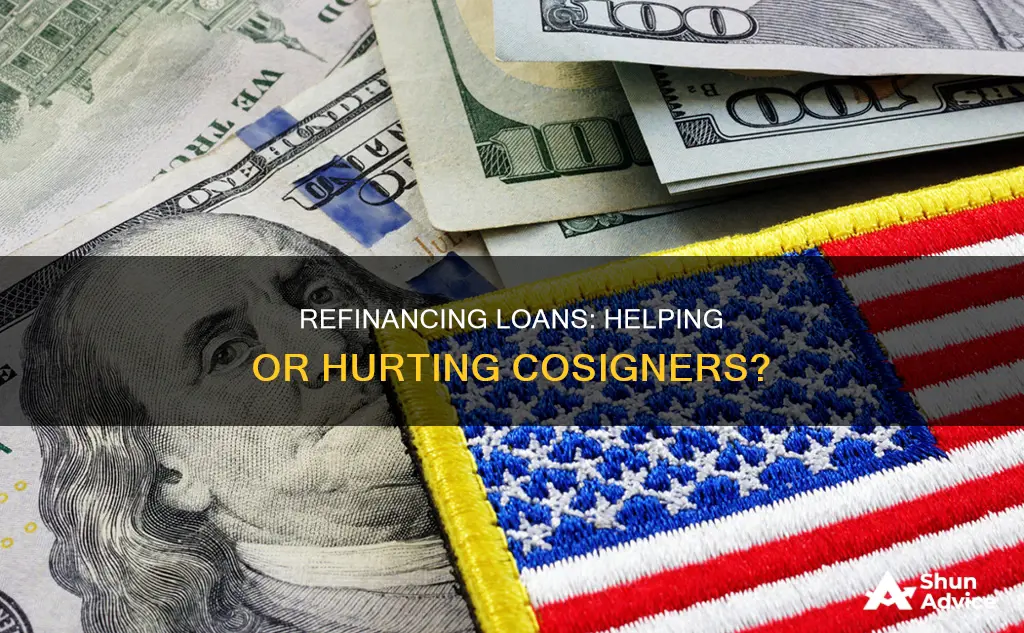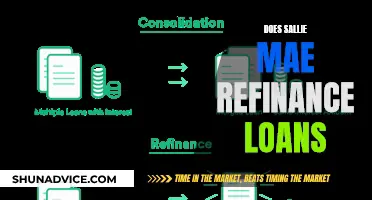
Refinancing a loan can be done with or without a cosigner, depending on your financial situation and goals. A cosigner with a good credit score and high income can help you secure a lower interest rate and more favourable terms for your loan. This can reduce your monthly payments and help you build better credit over time. However, it's important to carefully consider your options, as refinancing may come with early repayment fees, and failing to make timely payments can hurt both your and your cosigner's credit score.
| Characteristics | Values |
|---|---|
| Refinancing a loan with a cosigner | Possible |
| Cosigner qualifications | Good credit score, stable income, solid debt-to-income ratio |
| Benefits of a cosigner | Better interest rates, lower monthly payments, help build credit |
| Drawbacks of a cosigner | Legal responsibility for the loan, negative impact on credit if the borrower fails to make payments |
| Removing a cosigner | Pay off the loan entirely, apply for a cosigner release (if allowed by the contract) |
What You'll Learn

Cosigners can help secure better rates and terms for refinancing
Refinancing a loan can be a great way to secure better rates and terms, especially if you have a cosigner with a good credit score. A cosigner is someone who agrees to pay your loans if you default on your payments. They are usually close friends or family members and are financially tied to you until the loan is repaid.
When you add a cosigner to your loan, they become responsible for your loan payments if you are unable to pay. Their income and debt-to-income ratio must show that they can repay the loan on your behalf. Lenders will also conduct a background check to determine the liability of a cosigner and ensure they can afford the debt.
A cosigner with a good credit score can help you secure a lower interest rate and better terms on your refinanced loan. This is because lenders view the loan as less risky when there are two people responsible for repayment. As a result, you may be able to pay off your loan faster and build better credit over time.
However, it is important to carefully consider your options before adding a cosigner. Your cosigner's financial situation can affect your loan offer, and if you fail to make payments, their credit score may be negatively impacted. Therefore, it is crucial to ensure that you can make timely payments before adding a cosigner to your loan.
Recertifying for IDR: Loan Providers and What You Need to Know
You may want to see also

Cosigners are legally responsible for the loan
Refinancing a loan with a cosigner can be a great way to improve your financial situation. It can help you secure a better interest rate, lower monthly payments, and build better credit over time. However, it's important to remember that cosigners are legally responsible for the loan. This means that if you, as the primary borrower, fail to make your payments on time, it can hurt the cosigner's credit report and impact your relationship with them.
When a person agrees to become a cosigner, they are legally agreeing to pay off the loan on your behalf if you are unable to do so. Cosigners usually need to have a good credit score (typically above 670), a high income, and a solid debt-to-income ratio. Lenders will conduct a background check to determine the liability of a cosigner and ensure they can afford the loan payments if the primary borrower defaults. The cosigner's financial situation and credit score will impact the loan offer, so it's important to have open and honest discussions with them about their finances before applying for refinancing.
The legal responsibility of the cosigner means that their credit report and score can be negatively impacted if the primary borrower fails to make timely payments. This can create a strain on the relationship between the borrower and the cosigner. Therefore, it is crucial to carefully consider your financial situation and ensure that you will be able to make the required payments on time before committing to refinancing with a cosigner.
While refinancing with a cosigner can provide benefits, it is important to understand the risks involved. The cosigner is taking on a significant responsibility and assuming the same financial risk as the primary borrower. If the primary borrower defaults on the loan, the cosigner may struggle to remove themselves from this legal responsibility. Paying off the loan entirely is one way to automatically remove the cosigner, but this may not always be a practical option.
PSECU ATV Loans: What You Need to Know
You may want to see also

Cosigners should have a good credit score and high income
A cosigner with a good credit score and high income can help you secure a loan with better terms and a lower interest rate. This is because lenders view a loan with a cosigner as less risky, as the cosigner assumes the same financial responsibility as the borrower. The higher the cosigner's credit score, the more likely you are to qualify for the lowest interest rates.
For example, a cosigner with a credit score of 670 or above and a high income can help you secure a lower interest rate on an auto loan. This, in turn, can lower the cost of your refinanced car loan over time and reduce your monthly payments. Similarly, a cosigner with a good credit score and high income can help you secure a private student loan. This is because private lenders require you to meet certain underwriting criteria to be eligible for a loan, and a cosigner can help you meet these criteria.
However, it is important to remember that a cosigner is legally responsible for the loan. Therefore, if you fail to make your payments on time, your cosigner's credit report may be affected, and your relationship with them may be damaged. As such, it is recommended that you are confident you will be able to make your payments on time before asking someone to be your cosigner.
Additionally, while a cosigner can help you secure a loan with better terms, it is still important to build your own credit history. This can be done by making regular payments on your current loans and debts and checking your credit report for any errors. By improving your credit history, you may be able to secure a loan without the need for a cosigner in the future.
Refinance Loans: Reali's Offerings and Your Options
You may want to see also

Refinancing can help build credit and eliminate debt
Refinancing a loan can be a great way to build credit and eliminate debt. It is important to understand the benefits and drawbacks of refinancing before making a decision.
Building Credit
Refinancing a loan can help build credit over time. When you add a cosigner to your loan, the loan will appear on your credit report, increasing your credit score and history as long as you make timely payments. Additionally, adding another loan can lower your credit utilization ratio, further boosting your score. However, it is crucial to remember that failing to make timely payments can negatively impact your credit report and your relationship with the cosigner.
Eliminating Debt
Refinancing can help eliminate debt by providing more favorable terms and conditions. For example, refinancing can result in a lower interest rate, reducing the overall cost of the loan and allowing you to pay it off faster. Refinancing can also help consolidate multiple debts into a single loan, making debt management easier. In some cases, refinancing can provide access to additional cash, which can be used to pay off other high-interest debts.
Benefits of Refinancing with a Cosigner
Using a cosigner when refinancing can offer several advantages. A cosigner with a good credit score and high income can help you qualify for lower interest rates and better loan terms. This can reduce the cost of your loan and make it more manageable. Additionally, a cosigner can provide extra assurance to the lender that the loan will be repaid, increasing your chances of loan approval.
Drawbacks of Refinancing with a Cosigner
While refinancing with a cosigner can provide benefits, there are also some drawbacks to consider. Firstly, your cosigner bears legal responsibility for the loan. If you fail to make timely payments, it can negatively impact their credit report. Therefore, it is essential to choose a cosigner carefully and ensure that you are comfortable discussing your finances with them. Additionally, refinancing a loan may cause a temporary dip in your credit score due to hard inquiries on your credit report and the fact that you are taking on new debt.
Prosper Loans: Phone App Availability and Functionality
You may want to see also

Cosigners can be removed from a loan through refinancing
Refinancing a loan can help remove a cosigner and end their responsibility for the loan. However, it is important to carefully review the terms and details of the original loan and consider all options before refinancing.
Cosigners are usually close friends or family members who agree to take on full responsibility for the loan if the primary borrower defaults. They are often used when the primary borrower does not have a strong enough credit history or finances to qualify for a loan or a lower interest rate on their own. By agreeing to be legally tied to the primary borrower, the cosigner can help them secure a loan with more favourable terms.
However, if circumstances change, the primary borrower may want to remove the cosigner from the loan. One way to do this is by refinancing, which involves taking out a new loan, possibly with a different lender, to repay the existing loan. When refinancing, the primary borrower will need to meet certain underwriting criteria and qualify for the loan on their own. This typically includes demonstrating sufficient income to make monthly payments, having a positive and established credit history, and being able to afford the debt. It is important to note that refinancing may result in a slight dip in the credit score due to the hard pull of credit histories.
By refinancing, the primary borrower can remove the cosigner's responsibility for the loan and adjust other details such as the repayment term and interest rate. This allows them to take sole responsibility for the new loan and build their credit independently.
Purchasing Power: Loans and Employee Benefits
You may want to see also
Frequently asked questions
Refinancing is the process of taking out a new loan with more favourable terms to repay an existing loan.
Yes, it is possible to use a cosigner to refinance a loan. A cosigner is someone who agrees to share responsibility for the loan with you and can help you qualify for a better interest rate or loan terms.
Using a cosigner to refinance a loan can help you get a better interest rate, allow you to pay off your loan faster, and give you a chance to build better credit over time.
If you fail to make payments on the loan, both your credit and your cosigner's credit can be negatively impacted. It's important to remember that your cosigner bears legal responsibility for the loan.
There are a few ways to remove a cosigner from a refinanced loan, including paying off the loan in full or applying for a cosigner release if allowed per the loan contract.







